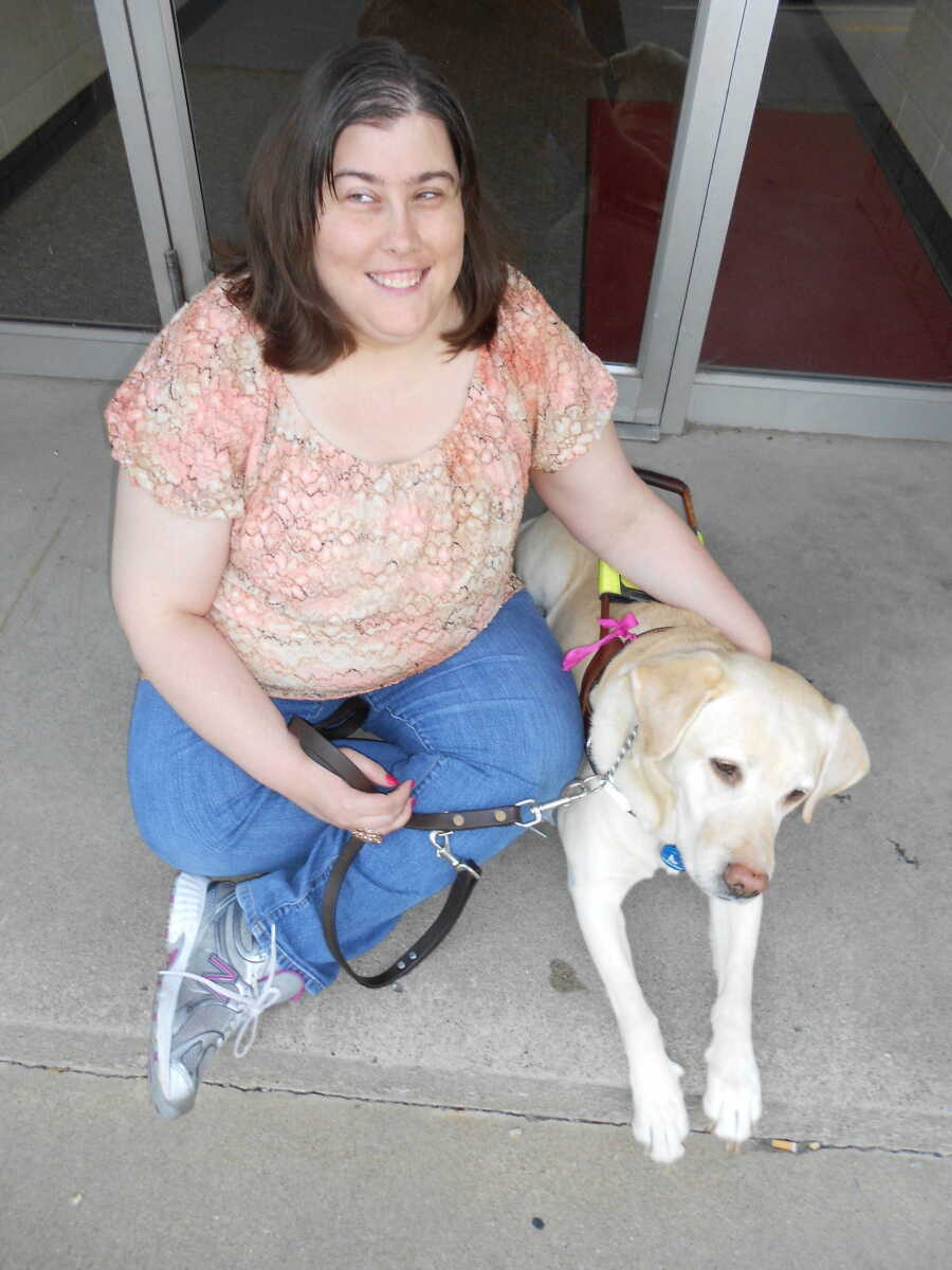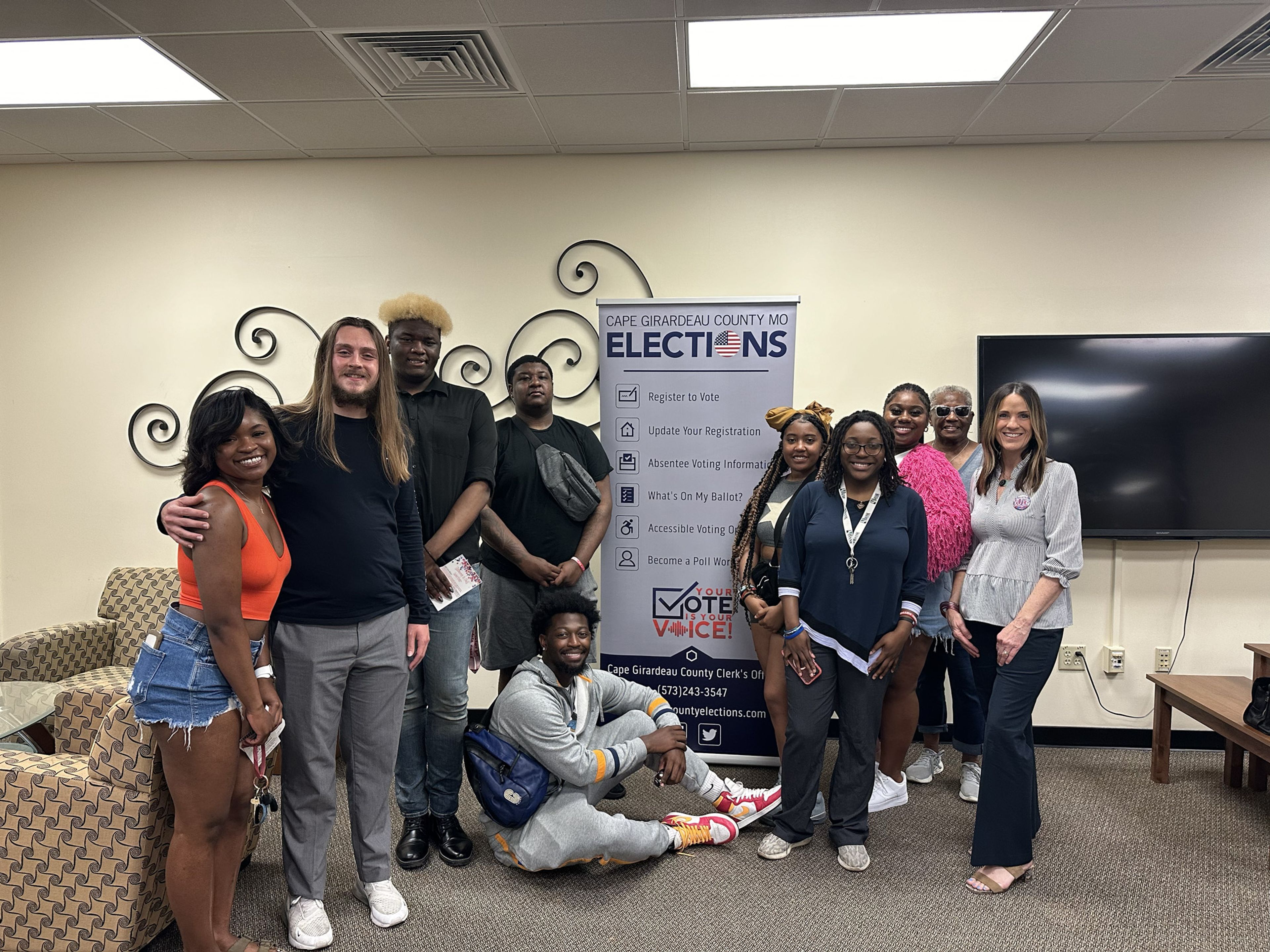Sindy Puckett will not walk across the stage alone to receive her master's degree. Elanor, her Leader Dog, will be at her side.
"Elanor is my best friend in the whole world," Puckett said. "She's become a part of me, she's like an extension of my left hand."
She will be the fourth visually-impaired student with a dog to graduate from Southeast Missouri State University.
Puckett, who plans to one day be an English professor at a community college, will accept her master's degree in English from Southeast Missouri State University. She plans to attend the University of Missouri to get her doctorate in English.
"It's a big deal for me because I am the first person in my family to graduate," Puckett said. "Right now I'm just taking everything one day at a time."
Puckett received a bachelor's degree in mass communication with an emphasis in journalism at Lincoln University in Jefferson City, Mo., in 2006, but her vision began to diminish during her senior year.
"I realized that I couldn't see the blackboard anymore, even when I was standing right in front of it," Puckett said. "It really worried me."
Puckett was born legally blind, but she had surgery before she turned 1 that brought her vision back. The doctors inserted synthetic lenses in her eyes that allowed her to see until the age of 24.
She was the first infant to undergo the surgery. The procedure previously only had been performed on people between the ages of 80 and 90.
The inserted lenses did not grow as her eyes did, so her corneas were pushed forward, causing her to begin losing her sight. Puckett has decided not to have another surgery to correct her vision due to the extreme pain it caused her.
When she discovered she couldn't continue with her original career choice and become a broadcast news editor, she decided to attend graduate school to study English, a subject she fell in love with during her last semester at Lincoln.
"I took an American English class and realized how much I liked it and am good at it," Puckett said.
Puckett chose to continue her studies at Southeast because she liked the English program, the low cost and the staff at Residence Life who helped arrange a room for her and Elanor.
Disability Services coordinator Emily Oliveira helped Puckett with class registration. She made sure Puckett's teachers knew that a visually impaired student was in their class ahead of time and would need special handouts and other accommodations.
Disability Services conducts discussions with students and staff about how to communicate and live alongside students with disabilities.
"We talk about what is appropriate and inappropriate terminology to make the campus more disability friendly," Oliveira said. "We can't change the hills, but we can change the attitude."
The most difficult adjustment for Puckett was the transition to a new campus that she and Elanor weren't familiar with. She had to wait two months for her Orientation and Mobility Instructor from Sikeston to show her around campus and Cape Girardeau. While waiting for her instructor, Oliveira showed Puckett around until she and Elanor became more and more comfortable with the area. Within two weeks Elanor already was able to lead Puckett to Grauel Building without being told where to go.
"I had a lot of help from people in my dorms also," Puckett said. "Southeast is very disability-student friendly and is a lot more accommodating than other campuses."
Puckett's textbooks are on audio and she listens to them with her computer on a CD and a Victor Reader Stream. A Victor Reader Stream works as an MP3 player that reads books out loud to students with vision problems. She also records her notes through the device and can play them back later instead of reading them. When she needs to read, Puckett uses a CC TV, a device that enlarges print like a digital magnifying glass. She can also use it to change font colors to make it more readable.
It takes Puckett longer to study than the average student because she can only listen to lectures.
"It's hard because if someone is making noise around me it blends in and I can't understand what the computer is reading to me," Puckett said. "And if a book isn't already in audio form then I have to scan the book page by page onto the computer for me to hear it."
Puckett can't get out to do a lot around campus because studying takes her so long, but she still makes time to reach out and meet new people. She is a member of Delta Alpha Pi, an honor society for students with disabilities.
"She's a great student because I literally have to go to her dorm and drag her away from homework to do things," said Southeast junior Ashley Pritchard, Puckett's close friend. "She's always positive, even when she's busy working on things."
Puckett said she's encountered a few problems on campus, like the ramp in front of Kent Library being blocked by a student group. Overall she has had no major problems with getting around on campus or with other students.
To get around Cape Girardeau, Puckett takes the city bus, uses the campus shuttle service or gets rides from friends. She said that most places she's visited haven't given her trouble about her Leader Dog.
Elanor will continue to be Puckett's Leader Dog for the next four months until she retires and is sent to live with a family. The 6-year-old dog will be replaced in early July because she has received too much attention from people over the years and has stopped fulfilling her duty.
"One day Elanor saw a friend of mine from across the street and led me into the street with traffic around," Puckett said. "For years she has never been more than a few inches away from me for more than a few hours. It's a tough decision to let her go because I love her, but she's a tool and she needs to keep me safe."
Puckett has completed Grade 1 of brail lessons that she started two years ago and she plans to complete Grade 2 by the end of this summer. She said learning brail is like learning a new language.
"I know what the textbook is teaching me," Puckett said. "But then there's all the slang and short-handed words that I need to know also."
Brail has cells made up of six dots that make up many different combinations to form words. Brail short hand condenses full words into two letters. Puckett has to read letter by letter and then put each word together in her head. Puckett has a brail writer that looks like a typewriter with six metal keys that she uses to type letters to her friends.
"I'm getting better, but I'm not where I want to be," Puckett said. "It's like learning to read all over again."





